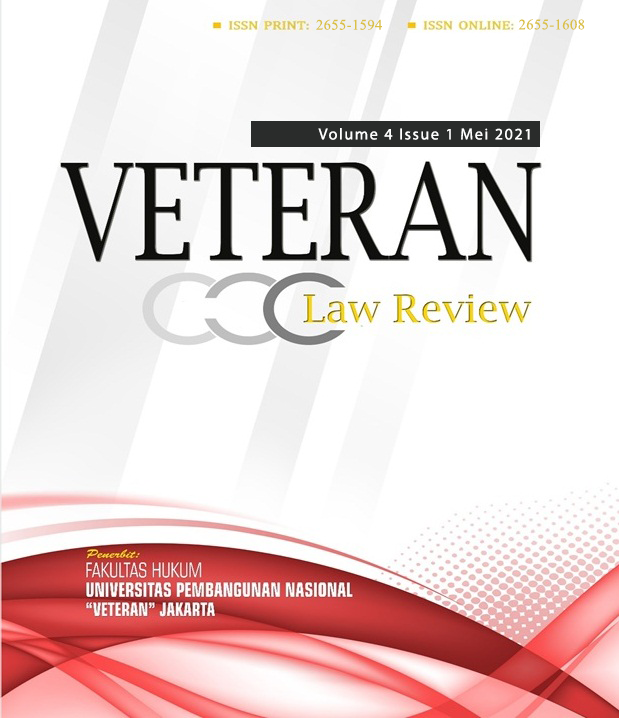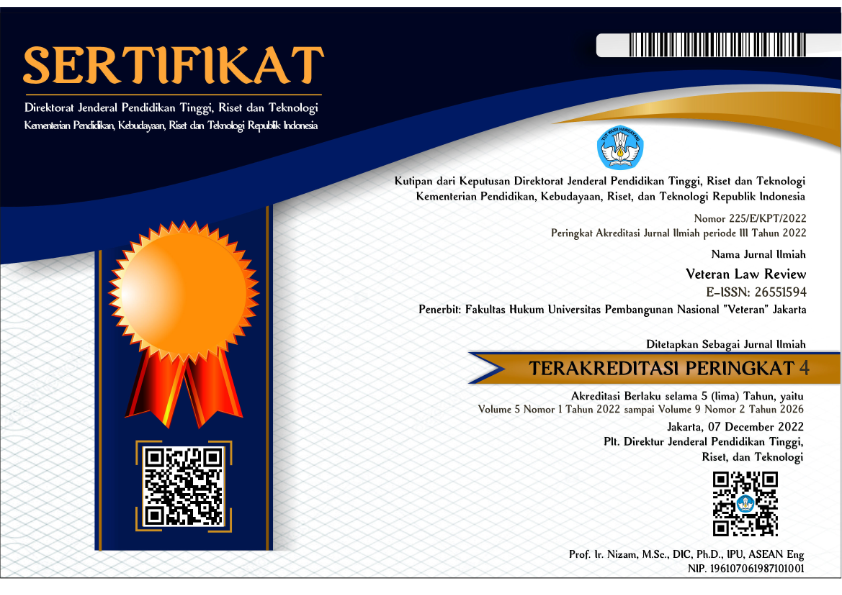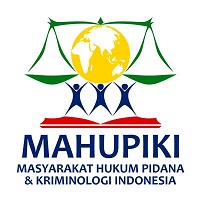Establish ASEAN-AUSTRALIA Communication In Resolving Humanitarian Issues For International Asylum Seekers and Refugees
DOI:
https://doi.org/10.35586/velrev.v4i1.2630Abstract
The current problem of refugees cannot be handled with policies that address the root of the problem. The increasing number of refugees in the Southeast Asian region makes transit countries overwhelmed in dealing with this problem. On the other hand, as a refugee recipient country in the last ten years, Australia has had a strict policy in accepting refugees. Australia's approach to return refugee ships to a transit country is a controversial policy because Australia itself is a country that signed the 1951 convention on refugee status. On the other hand, the existence of refugees and asylum seekers has a significant impact on the local community's social changes, and the current refugee policy arrangement is still in the hands of UNHCR ( United Nations High Commissioner for Refugees) under the auspices of the United Nations. There has been no concrete communication to touch the root of the problem of refugees and asylum seekers. Through an enthusiastic approach and communication with community-based management between ASEAN countries and Australia, it is hoped that it can resolve human rights issues related to supervision to empower refugees in society to become citizens of a third country, in this case, Australia.
Downloads
References
Apriani, Amanda. “Perancangan Penampungan Pengungsi Di Pulau Selayar, Sulawesi Selatan.” Universitas Hasanuddin, 2020.
Aryuni, Yuliantiningsih. “"Perlindungan Pengungsi Dalam Perspektif Hukum Internasional Dan Hukum Islam (Studi Terhadap Kasus Manusia Perahu Rohingya ).” Dinamika Hukum 13 (2013): 160.
Bachtiar. METODE PENELITIAN HUKUM. Tangerang Selatan. UNPAM PRESS, 2019.
Bagaskara, and Annaas Maulana. “Kerjasama Pemerintah Indonesia Dan ECPAT Dalam Menangani Permasalahan Child Trafficking Di Indonesia.” Journal of International Relations, 4, no. 3 (2018).
Jalil, Aslam Abd. “The Conversation. n.d. Https://Theconversation.Com/Hak-Untuk-Bekerja-Dapat-Memberdayakan-Para-Pengungsi-Di-Malaysia-119928 (Diakses Februari 7, 2021).,” n.d.
Krustiyati, Atik. “Kepentingan Indonesia Dalam Masyarakat Ekonomi Asean Terhadap Isue Pengungsi Yang Merupakan Persoalan Transboundaries.” Fakultas Hukum Universitas Surabaya, 2017.
News, Antara. “Https://Www.Antaranews.Com/Berita/963401/Komisi-i-Dpr-Pemindahan-Pengungsi-Ke-Pulau-Kosong-Butuh-Perencanaan,” n.d.
Republika. “Https://Republika.Co.Id/Berita/Nasional/Umum/19/07/16/Puqluq383-Pemerintah-Diminta-Carikan-Pulau-Kosong-Untuk-Pengungsi (Accessed Februari 7, 2021).” Republika.co.id, 2016.
Sihombing, and Herlina Yosepina. “Kebijakan Indonesia Dalam Perlindungan Pencari Suaka Dan Pengungsi Pasca Kebijakan Turn Back the Boat Pemerintahan Tony Abbott.” Journal of International Relations 5, no. 4 (2019): 601–2.
Zaimah, and Ayu Hannah. "Urgensi Pembentukan Pengadilan Hak Asasi Manusia (HAM) Oleh ASEAN Inter-Governmental Comission On Human Rights (AICHR). 2015: 4. Malang: Universitas Brawijaya, 2015.
Zulfikar, and Achmad. "Efektivitas Peran ASEAN Dalam Mengatasi Masalah Human Security Di Kawasan Asia Tenggara. Yogyakarta: Universitas Muhammadiyah, 2013.
Downloads
Published
How to Cite
Issue
Section
License
Copyright (c) 2022 Veteran Law Review Journal
Veteran Law Review © 2022 by Faculty of Law Universitas Pembangunan Nasional "Veteran" Jakarta is licensed under Creative Commons Attribution 4.0 International

1. License
The non-commercial use of the article will be governed by the Creative Commons Attribution license as currently displayed on Creative Commons Attribution 4.0 International.
2. Author(s)' Warranties
The author warrants that the article is original, written by the stated author(s), has not been published before, contains no unlawful statements, does not infringe the rights of others, is subject to copyright that is vested exclusively in the author, and free of any third party rights, and that any necessary written permissions to quote from other sources have been obtained by the author(s).
3. User/Public Rights
VELREV's spirit is to disseminate articles published are as free as possible. Under the Creative Commons Attribution-ShareAlike 4.0 International License. VELREV permits users to copy, distribute, display, and perform the work for non-commercial purposes only. Users will also need to attribute authors and VELREV to distributing works in the journal and other media of publications.
4. Rights of Authors
Authors retain all their rights to the published works, such as (but not limited to) the following rights;
- Reproduce the work
- Prepare derivative works based upon the work
- Distribute copies of the work
- Perform the work publicly
- Display the work publicly
- Copyright and other proprietary rights relating to the article, such as patent rights,
- The right to self-archive the article,
- The right to enter into separate, additional contractual arrangements for the non-exclusive distribution of the article's published version (e.g., post it to an institutional repository or publish it in a book), with an acknowledgement of its initial publication in this journal (Veteran Law Review).
5. Co-Authorship
If the article was jointly prepared by more than one author, any author submitting the manuscript warrants that he/she has been authorized by all co-authors to be agreed on this copyright and license notice (agreement) on their behalf, and agrees to inform his/her co-authors of the terms of this policy. VELREV will not be held liable for anything that may arise due to the author's internal dispute. VELREV will only communicate with the corresponding author.
6. Royalties
Being an open accessed journal and disseminating articles for free under the Creative Commons license term mentioned, author(s) are aware that VELREV entitles the author(s) to no royalties or other fees.
7. Miscellaneous
VELREV will publish the article (or have it published) in the journal if the article’s editorial process is successfully completed. JOSI's editors may modify the article to a style of punctuation, spelling, capitalization, referencing, and usage that deems appropriate. The author acknowledges that the article may be published so that it will be publicly accessible and such access will be free of charge for the readers as mentioned in point 3.


















